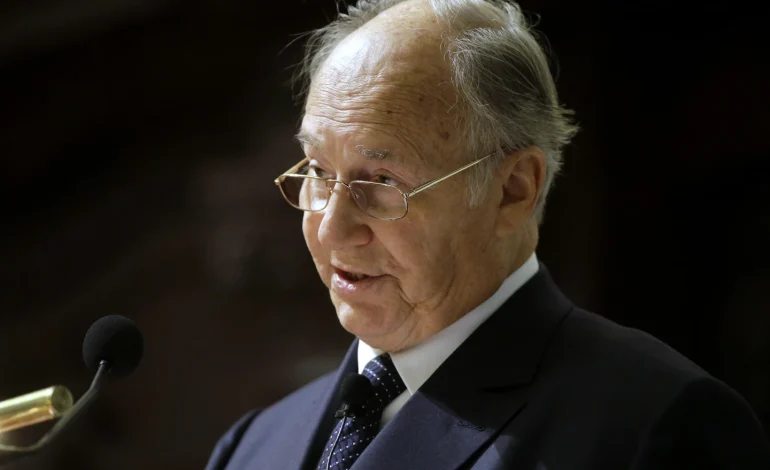His Highness Prince Karim Al-Hussaini, the Aga Khan IV, the 49th hereditary Imam of Shia Ismaili Muslims, has died at the age of 88, The Associated Press reports.
The Aga Khan Development Network and the Ismaili religious community announced that he passed away peacefully in Portugal, surrounded by his family, on Tuesday.
The Aga Khan, considered by his followers to be a direct descendant of the Prophet Muhammad, ascended to the role of spiritual leader at the young age of 20 while a student at Harvard University. He inherited not only the spiritual leadership but also a vast material empire built on billions of dollars in tithes, which he channeled into philanthropic endeavors across the developing world.
His successor, chosen from among his male descendants or other relatives, has been designated in his will. The name will be revealed following a reading of the will in Lisbon, attended by family and religious leaders. A date for the reading has not yet been announced.
The Aga Khan’s grandfather, Aga Khan III, surprisingly named him as his successor, bypassing his own son, citing the need for a young leader “who has been brought up in the midst of the new age.” He formally became the Aga Khan IV on Oct. 19, 1957, in Dar es Salaam, Tanzania, a site of historical significance where his grandfather had once received his weight in diamonds as gifts from his devoted followers. He briefly left Harvard to be at his ailing grandfather’s side before returning with a heightened sense of responsibility.
Over his long and influential life, the Aga Khan evolved into a prominent business magnate and a renowned philanthropist. He skillfully navigated the intersection of the spiritual and secular realms.
News of his passing prompted immediate mourning within Ismaili communities worldwide, with ceremonies held in the U.S. and condolences pouring in from various organizations he supported, including charity groups and figures in the equestrian world.
Queen Elizabeth II bestowed upon him the title of “His Highness” in July 1957, recognizing his status as the leader of the Ismaili Muslim sect, a title inherited from his family’s 1,300-year dynasty.
The Aga Khan was a staunch defender of Islamic culture and values, known for building bridges between Muslim societies and the West through dialogue and understanding. While generally avoiding direct political involvement, he played a significant role in shaping global development.
His primary philanthropic arm, the Aga Khan Development Network (AKDN), addresses critical issues such as health care, housing, education, and rural economic development in over 30 countries. The AKDN operates with an annual budget of approximately $1 billion dedicated to nonprofit development initiatives. A network of hospitals bearing his name provides crucial medical care in underserved regions, including Bangladesh, Tajikistan, and Afghanistan, where he invested heavily in local economies.
Born on December 13, 1936, in Creux-de-Genthod, near Geneva, Switzerland, to Joan Yarde-Buller and Aly Khan, the Aga Khan spent part of his childhood in Nairobi, Kenya, where a hospital now bears his name.
Beyond his spiritual and philanthropic work, the Aga Khan was also known for his passions. He was a respected horse breeder and owner, and he represented Iran as a skier in the 1964 Winter Olympics. His interest in architecture led him to establish an architecture prize and programs for Islamic Architecture at MIT and Harvard. He dedicated himself to restoring ancient Islamic structures around the world.
While the extent of the Aga Khan’s financial empire remains difficult to quantify, estimates place his personal wealth in the billions. The Ismaili community, with roots in India and a global presence spanning East Africa, Central and South Asia, and the Middle East, considers it a duty to contribute up to 12.5% of their income as a tithe to him.
The Aga Khan resided in France for many years and was based in Portugal more recently. His development network and foundation are headquartered in Switzerland.
He will be buried in Lisbon, with the date of the ceremony to be announced. He is survived by three sons, a daughter, and several grandchildren.








